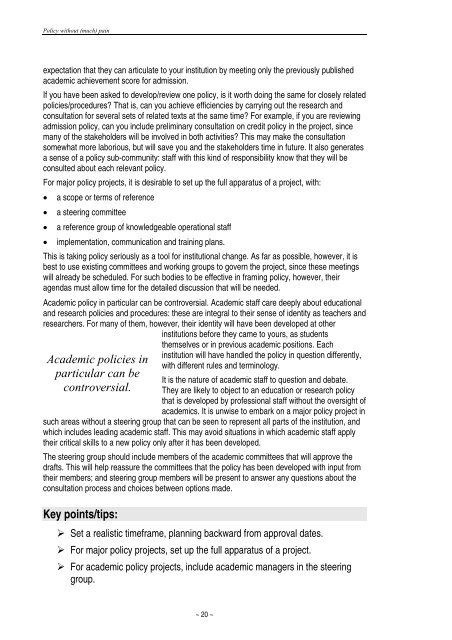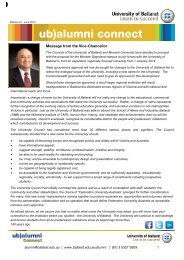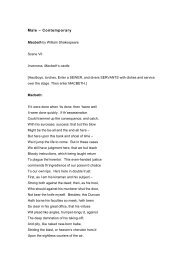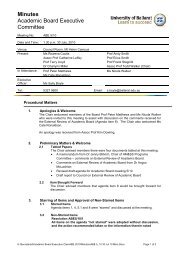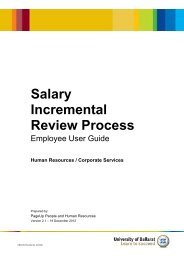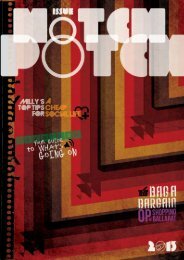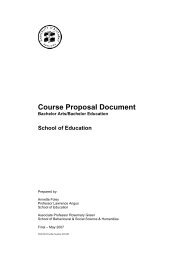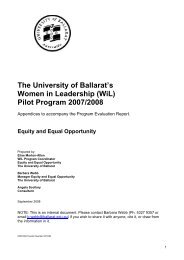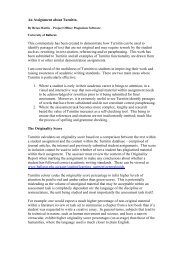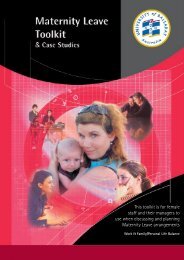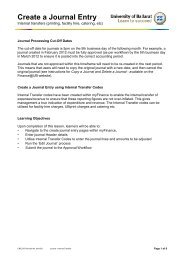Policy without (much) pain - University of Ballarat
Policy without (much) pain - University of Ballarat
Policy without (much) pain - University of Ballarat
- No tags were found...
Create successful ePaper yourself
Turn your PDF publications into a flip-book with our unique Google optimized e-Paper software.
<strong>Policy</strong> <strong>without</strong> (<strong>much</strong>) <strong>pain</strong>expectation that they can articulate to your institution by meeting only the previously publishedacademic achievement score for admission.If you have been asked to develop/review one policy, is it worth doing the same for closely relatedpolicies/procedures? That is, can you achieve efficiencies by carrying out the research andconsultation for several sets <strong>of</strong> related texts at the same time? For example, if you are reviewingadmission policy, can you include preliminary consultation on credit policy in the project, sincemany <strong>of</strong> the stakeholders will be involved in both activities? This may make the consultationsomewhat more laborious, but will save you and the stakeholders time in future. It also generatesa sense <strong>of</strong> a policy sub-community: staff with this kind <strong>of</strong> responsibility know that they will beconsulted about each relevant policy.For major policy projects, it is desirable to set up the full apparatus <strong>of</strong> a project, with: a scope or terms <strong>of</strong> reference a steering committee a reference group <strong>of</strong> knowledgeable operational staff implementation, communication and training plans.This is taking policy seriously as a tool for institutional change. As far as possible, however, it isbest to use existing committees and working groups to govern the project, since these meetingswill already be scheduled. For such bodies to be effective in framing policy, however, theiragendas must allow time for the detailed discussion that will be needed.Academic policy in particular can be controversial. Academic staff care deeply about educationaland research policies and procedures: these are integral to their sense <strong>of</strong> identity as teachers andresearchers. For many <strong>of</strong> them, however, their identity will have been developed at otherinstitutions before they came to yours, as studentsthemselves or in previous academic positions. EachAcademic policies inparticular can becontroversial.institution will have handled the policy in question differently,with different rules and terminology.It is the nature <strong>of</strong> academic staff to question and debate.They are likely to object to an education or research policythat is developed by pr<strong>of</strong>essional staff <strong>without</strong> the oversight <strong>of</strong>academics. It is unwise to embark on a major policy project insuch areas <strong>without</strong> a steering group that can be seen to represent all parts <strong>of</strong> the institution, andwhich includes leading academic staff. This may avoid situations in which academic staff applytheir critical skills to a new policy only after it has been developed.The steering group should include members <strong>of</strong> the academic committees that will approve thedrafts. This will help reassure the committees that the policy has been developed with input fromtheir members; and steering group members will be present to answer any questions about theconsultation process and choices between options made.Key points/tips:‣ Set a realistic timeframe, planning backward from approval dates.‣ For major policy projects, set up the full apparatus <strong>of</strong> a project.‣ For academic policy projects, include academic managers in the steeringgroup.~ 20 ~


